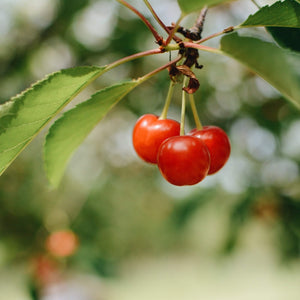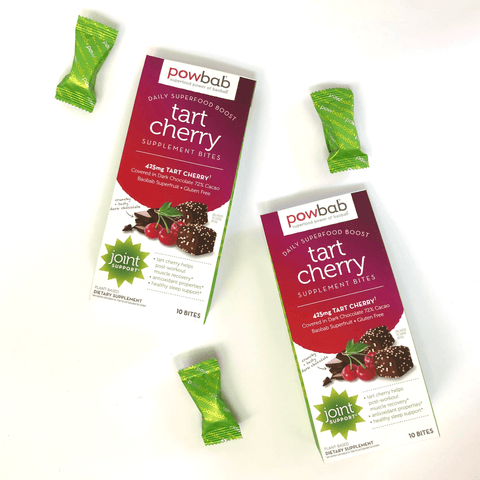
 Cherries are a stone fruit, that so many people love to eat when in season as delicious fruit, a rustic cherry pie or cherry cobbler, or drink as cherry juice. Some tart cherry recipes use organic tart cherry juice, or a cherry on top of a sundae or in smoothie bowls. Fresh sweet cherries are part of summertime fun in the United States. Cherries blossom in April (in the Northern Hemisphere) and the peak season for harvesting cherries is during the summer. There are many benefits of cherry juice and different variety of cherries. Most commonly, we see Bing sweet cherries for sale in the produce department at the grocery store. There are maybe 1,000 different varieties of cherries (not all edible); however only 10 species that are commercially produced in the United States. The tart cherry or sour cherry variety is getting more studies as it shows profound benefits.
Cherries are a stone fruit, that so many people love to eat when in season as delicious fruit, a rustic cherry pie or cherry cobbler, or drink as cherry juice. Some tart cherry recipes use organic tart cherry juice, or a cherry on top of a sundae or in smoothie bowls. Fresh sweet cherries are part of summertime fun in the United States. Cherries blossom in April (in the Northern Hemisphere) and the peak season for harvesting cherries is during the summer. There are many benefits of cherry juice and different variety of cherries. Most commonly, we see Bing sweet cherries for sale in the produce department at the grocery store. There are maybe 1,000 different varieties of cherries (not all edible); however only 10 species that are commercially produced in the United States. The tart cherry or sour cherry variety is getting more studies as it shows profound benefits.
The secret to the benefits of tart cherries and tart cherry juice are found in its compounds called anthocyanins. Anthocyanins give tart cherries their bright red color, and are considered a big part of helping the body relieve inflammation. Believed to be the main driver of cherry benefits, anthocyanins decrease uric acid and improve symptoms of gout pain. Cherries (and raspberries) seem to have the highest yields of pure anthocyanins. Anthocyanins provide other benefits to the body as well besides dealing with gout symptoms, including help with sore muscles, cardiovascular health, and sleep apnea or insomnia.
Many people use tart cherry or tart cherry juice for gout, but what exactly is gout?
Gout is an inflammatory, metabolic arthritis. Gout symptoms include a painful condition resulting from needle-like crystals of uric acid in joints and other tissues. Gout is a disorder in which the body cannot metabolize uric acid. Uric acid is a heterocyclic compound of carbon, nitrogen, oxygen, and hydrogen; it is a normal component of urine. However, high blood concentrations of uric acid can lead to gout and are associated with other medical conditions including diabetes and certain kidney stones. When the body accumulates too much uric acid, the crystals deposit into and develop foot gout, gout toe, gout knee, gout symptoms in the joints, and troublesome pain and discomfort.
Foods that have a high content of purines seem to cause gout flare-ups. Avoid foods with a relatively higher purine content in order to combat gout pain. Some of these foods include: liver meats, organ and game meats, sardines, mussels, anchovies, and beer.
Many people seek home remedies for gout or what to take for gout pain. A few natural home remedies incorporate other foods or products into your diet for better management: apple cider vinegar (mix with water and drink), ginger root (make into a tea or add to food), and freshly squeezed lemon juice (mix with water and drink).
One of the best foods for gout pain is tart cherries.

Tart cherries can be consumed in variety of ways. Find what works best for you.
Any of the above are ways to get tart cherry into your diet or regimen; however, there are reasons why some people choose certain options or pick a combination of options.
Fresh tart cherries are seasonal and not easy to get unless you live in the Midwest or certain areas. Also, fresh tart cherries are...well, tart and sour! Dried tart cherries make nice additions to salads and foods, but can contain high sugar content because many varieties for sale are with added sugar.
Raw sweet cherries are: 82% water, 16% carbohydrates, 1% protein, and negligible in fat, as seen from the nutrition fact information from the USDA database. As raw fruit, sweet cherries provide little nutrient content per 100 g serving, as only dietary fiber and vitamin C are present in moderate amount, while other vitamins and dietary minerals each supply less than 10% of the Daily Value (DV) per serving, respectively[2]. Compared to sweet cherries, raw tart cherries contain 50% more vitamin C per 100 g (12% DV) and about 20 times more vitamin A (8% DV), beta-Carotene in particular[2].
When looking at an 8 fl. oz. bottle of cherry tart juice (one serving), the sugar content can be from 25-29 grams per bottle. The label might claim that 'no sugar' is added; however, sugar is still sugar, and the sugars can really add up if consuming on a daily basis. Sugars are necessary in the human diet, but in moderation.
Tart cherry capsules and pills can be a viable option, especially because you can take it and forget about it. However, be aware of the other ingredients found in capsules or pills as many brands contain magnesium stereate, silicon dioxide, stearic acid, etc.
Typical tart cherry powder is a good option when you can add it to your daily food such as smoothies, breakfast, etc. Look for organic tart cherry powder or a tart cherry supplement that delivers natural tart cherry in an easy to eat option with relatively low sugar.
 powbab® Tart Cherry Supplement Bites are a great option that delivers 425 mg of tart cherry in every serving, covered in 72% cacao dark chocolate and are conveniently individually wrapped. Each serving is only 2 grams of sugar. What a treat!
powbab® Tart Cherry Supplement Bites are a great option that delivers 425 mg of tart cherry in every serving, covered in 72% cacao dark chocolate and are conveniently individually wrapped. Each serving is only 2 grams of sugar. What a treat!
Sleep quality and efficiency are impacted by the hormone melatonin, which plays a role in a person's natural sleep-wake cycle.
“Your body produces melatonin naturally. It doesn’t make you sleep, but as melatonin levels rise in the evening it puts you into a state of quiet wakefulness that helps promote sleep,” explains Johns Hopkins sleep expert Luis F. Buenaver, Ph.D., C.B.S.M.
Sleep insomnia cause many people looking for how to sleep better, get better sleep, especially natural ways to sleep better. There are studies that have shown positive melatonin production in the body as a result of consuming tart cherries. Other studies show that tart cherries are helpful with sleep quality.
One study in particular researched the effect of tart cherry juice (Prunus cerasus) on urinary melatonin levels in healthy adults and enhanced sleep quality. The results showed that:
"Total melatonin content was significantly elevated (P < 0.05) in the cherry juice group, whilst no differences were shown between baseline and placebo trials. There were significant increases in time in bed, total sleep time and sleep efficiency total (P < 0.05) with cherry juice supplementation. Although there was no difference in timing of the melatonin circardian rhythm, there was a trend to a higher mesor and amplitude."
The study concludes that the data suggests that consumption of tart cherry juice concentrate provides an increase in exogenous melatonin that is beneficial for improving sleep duration and sleep quality in both healthy men and women and might be beneficial in managing disturbed sleep.
Tart cherry has shown to reduce muscle soreness after a workout or strenuous exercise. According to a study from 2016 that was done to show the effects of powdered tart cherry and how this supplementation affected muscles and inflammatory stress. Here are the results from the study.
"Results revealed that short-term supplementation of Montmorency powdered tart cherries surrounding an endurance challenge attenuated markers of muscle catabolism, reduced immune and inflammatory stress, better maintained redox balance, and increased performance in aerobically trained individuals. Effects of powdered Montmorency tart cherry supplementation on acute endurance exercise performance in aerobically trained individuals."
Lastly, this study done in 2010 and was a randomized, double blind, placebo controlled trial. The study tested 45 healthy runners in two groups 1) 36 male 2) 18 female with an age range of 35.8 ± 9.6 yrs. They ran an average of 26.3 ± 2.5 km over a 24 hour period. One group drank tart cherry juice and the other drank a placebo tart cherry juice.
"While both groups reported increased pain after the race, the cherry juice group reported a significantly smaller increase in pain (12 ± 18 mm) compared to the placebo group (37 ± 20 mm) (p < .001).
Ingesting tart cherry juice for 7 days prior to and during a strenuous running event can minimize post-run muscle pain. Efficacy of tart cherry juice in reducing muscle pain during running: a randomized controlled trial."
Additional Sources:
Heinig, M.; Johnson, R. J. (December 2006). "Role of uric acid in hypertension, renal disease, and metabolic syndrome". Cleveland Clinic Journal of Medicine. 73 (12): 1059–1064. doi:10.3949/ccjm.73.12.1059. PMID 17190309.
Richette, P.; Bardin, T. (January 2010). "Gout". Lancet. 375 (9711): 318–328. doi:10.1016/S0140-6736(09)60883-7. PMID 19692116.
[2] US Department of Agriculture National Nutrient Database, Standard Reference 21. Nutritiondata.com. Archived from the original on 11 February 2013. Retrieved 19 February 2013.
There are many things we can do to boost our immune system to naturally protect our self from the flu, avoid getting sick, prevent a cold, stop other people catching my cold.
